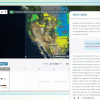NASA captures images of strong solar flares

Two high-intensity solar flares were emitted Wednesday, the second of which was the most intense recorded since the start of this sun cycle in December 2008, NASA said.
These radiation flares, which can disrupt communications satellites, GPS and power grids by reaching the upper Earth atmosphere, were detected and captured by the US Space Agency's Solar Dynamics Observatory.
According to the Space Weather Prediction Center (SWPC), these so-called category X eruptions disrupted high-frequency radio communications for one hour on the Earth's side facing the sun and low-frequency communications used in navigation.
The two eruptions occurred in an active region of the sun where an eruption of average intensity occurred on September 4. The current cycle of the sun, which began in December 2008, saw the intensity of solar activity decline sharply, opening the way to the "solar minimum."
Solar cycles last on average eleven years. At the end of the active phase, these eruptions become increasingly rare but still can be powerful.
Solar storms result from an accumulation of magnetic energy in some places.
These jets of ionized matter are projected -- at high speed into and beyond the crown of the sun -- hundreds of thousands of kilometers outward.

 For all latest news, follow The Daily Star's Google News channel.
For all latest news, follow The Daily Star's Google News channel. 








Comments